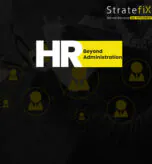Blog read time : 5-6 Minutes
“To win the marketplace, you must first win the workplace.”
For any business being it SME sectors to large Conglomerates, Your people are your greatest resource. One way to be sure your business will succeed is to look after your team. Treat your employees fairly and provide them with opportunities to grow, and in return they’ll help you to achieve your ideas and hit your business goals. And of this is all down to HR.
Human resource is a contemporary, umbrella term used to describe the management and development of employees in an organization. Also called personnel or talent management (although these terms are a bit antiquated), human resource management involves overseeing all things related to managing an organization’s human capital.
Human resource management focuses on a number of major areas, including:
- Recruiting and staffing
- Compensation and benefits
- Training and learning
- Labor and employee relations
- Organization development
But, HR management has changed dramatically in recent decades. The concept behind human resource management is that employees who are subject to effective human resource management are able to more effectively and productively contribute to a company’s overall direction, thereby ensuring that company goals and objectives are accomplished.
Strategic HR
A comprehensive strategy addresses all the key areas of HR: recruitment, compensation, learning and development, performance appraisal, and succession planning. When HR strategy and the business are aligned, magic happens.
Strategic HR is managing HR in a way that supports the company’s long-term business goals and outcomes. In essence, you go way beyond the administrative duties HR has been known for and apply HR principles and practices to overall business strategy.
Strategic HR leads to profitability:
- Formal training on business competencies
Training & continuous learning is really helpful for an organization in the long run. Before you can start contributing to an HR strategy, you need to understand how strategic business works. It’s important to have HR training in areas like leveraging networks, data judgment, business acumen and leadership.
[76% of business leaders depend on collaboration in developing their businesses’ strategies, and that’s where we can step in.]
- Know your company inside and out
A owner & a team who understand the business’ metrics, financial model and organizational risks, is a healthy & productive organization. You probably understand there are many more things about HRM than you realize. To dig even deeper, take some time from your work “on the front line” and ask questions about its history and really learn the products.
(Recent study revealed that HR professionals who understand business are uniquely capable of “linking business strategy with talent management.”)
- Develop metrics and analytics
Learn business metrics like profit, margin, ROI and TSR, and you’ll be a huge asset to strategic business leaders. But by developing your own metrics of turnover, employee attitudes, bench strength and performance distributions, and integrating them into business metrics and strategic HR, you’ll have an invaluable understanding of your people, as well as the vested interest of the leaders who are driving the business.
(78% of business leaders are using data to make business strategy decisions.)
- Create data-based strategies
It’s important to assess emerging trends and HR best practices, but actions and policies of the HR professional should always be propelled by data. Data can drive practices that support emerging trends and develop into viable business opportunities, or may reveal that current business and HR strategies more appropriately align with the organization’s goals.
(74% of business leaders generally use the past data & figures to make corrective decisions in the long run.)
- Assess organizational readiness
By combining business and HR metrics, you’ll be able to evaluate whether the organization has the resources, manpower and support to implement different strategies. Since the recommendations that come from this type of analysis bridge HR with the broader business goals and strategy. This is the essence of strategic HR.
(According to research, HR professionals who regularly perform this activity are much more strategic and effective.)
Conclusion
After reading this blog, We are assured that you have a much clearer picture of how strategic HR plays a very important role for a business success & leads to profitability.
Today’s human resource management team is responsible for much more than traditional personnel or administrative tasks. Human resource management involves both strategic and comprehensive approaches to managing people, as well as workplace culture and environment focusing on adding value to the strategic utilization of employees and ensuring that employee programs are impacting the business in positive and measurable ways in order to have a measured and proven impact on business objectives.
StratefiX passionately delivers its Advisory and Implementation Services in the area of Management Consulting to clients varying from SME sectors to large Conglomerates. If you have any questions or wants to know more information related to Strategic HR & HRM, Contact us.







